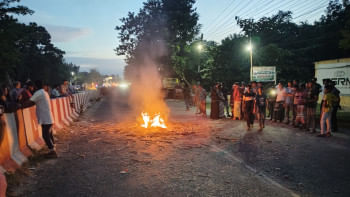Govt, NGOs should work hand in hand
Both the government and non-government organisations (NGOs) should work on a priority basis to meet basic needs like education and healthcare of the children living in Haor areas, said speakers at a dialogue in the capital yesterday.
They said the children in Haors get limited access to various fundamental rights and needs, comparing to the children of other areas.
Save the Children, JAAGO Foundation and The Daily Star organised the dialogue on "Our Deprived Children in the Thoughts of Youth: Policy Action to Overcome the Existing Difficulty" at Shilpakala Academy.
The event was organised under a programme called "Bridging the Gap” as part of the global “Every Last Child” campaign by Save the Children to ensure basic rights of marginalised and deprived children of Bangladesh.
A team of young volunteers visited two most disadvantaged areas -- a haor in Habiganj and a slum in Rayerbazar. They talked to children, learnt about their conditions. At the dialogue, they narrated their experience.
Zayem Bin Tajdid, a volunteer, said, “Children in those areas have little access to education … and they do not get sufficient medical services.”
“Children (in the haor area) have to go to school by boats … many of them are not even aware of water-borne diseases…,” he added.
Speaking at the discussion, Md Mujibur Rahman, director general (DG) of Directorate of Bangladesh Haor and Wetland Development, said at least 24 percent people live under poverty line in the country.
Of them, 18 percent are from Haor areas, he said, adding that most of these children do not have access to education and other facilities.
“NGOs need to work on primary education in Haor areas,” he suggested, adding that the government is also trying to take different measures to help the people in the areas.
Emphasising the importance of cultural activities, Anjir Liton, director of Bangladesh Shishu Academy, said children living in the cities can participate in different cultural activities but those who are living in the remote areas cannot.
Underscoring the need for investing in children, Afrin Ara Begum, additional secretary (budget) of Finance Division in the Ministry of Finance, said none should be left behind, not even children, if the country wants to gain the status of a middle-income country.
Kazi Rowshan Akhter, DG of Department of Women Affairs, said a concerted effort is needed to ensure the rights of the deprived children in remote areas.
Dr Ishtiaq Mannan, deputy country director (programme operations) of Save the Children, called upon the youths to be vocal and work together to ensure the rights of the children.
Prof Abul Kalam Azad, DG of the Directorate General of Health Service, and SM Haroon-or-Rashid, DG of Bangladesh Television, also spoke.

 For all latest news, follow The Daily Star's Google News channel.
For all latest news, follow The Daily Star's Google News channel. 



Comments